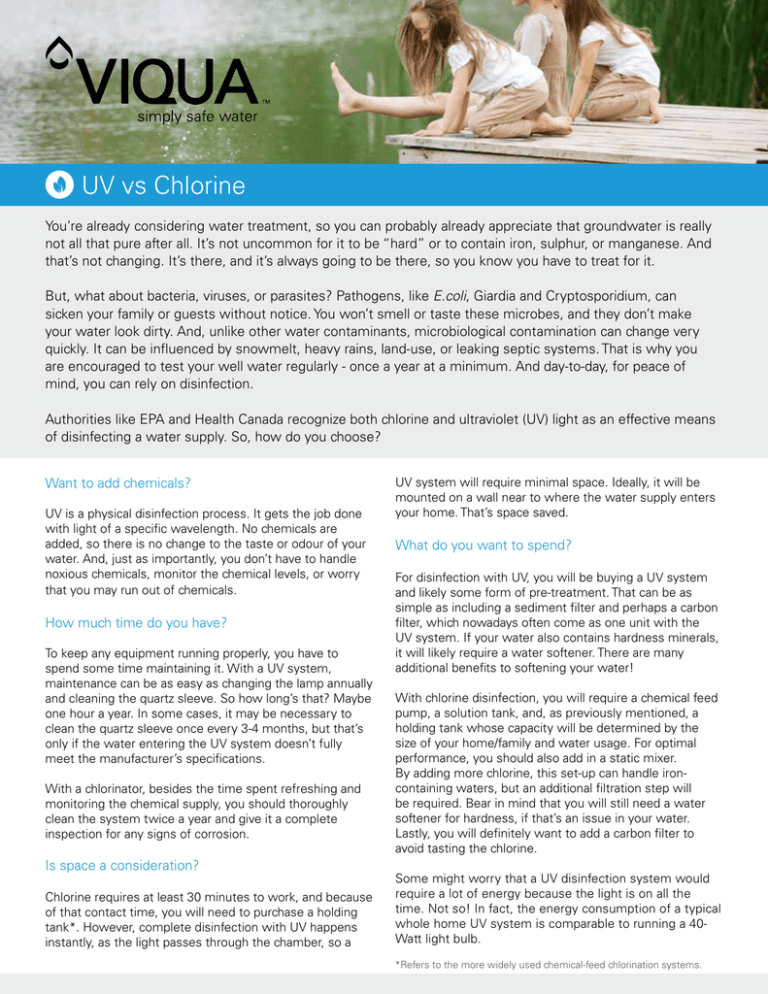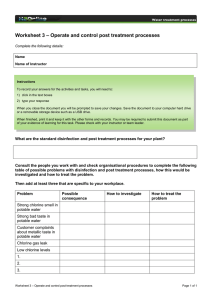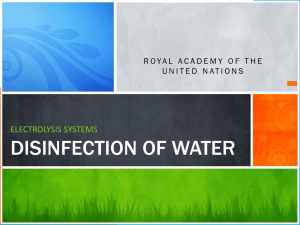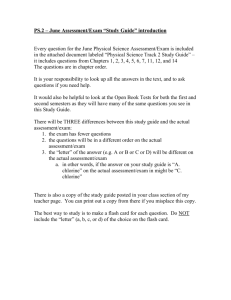UV vs Chlorine
advertisement

UV vs Chlorine You’re already considering water treatment, so you can probably already appreciate that groundwater is really not all that pure after all. It’s not uncommon for it to be “hard” or to contain iron, sulphur, or manganese. And that’s not changing. It’s there, and it’s always going to be there, so you know you have to treat for it. But, what about bacteria, viruses, or parasites? Pathogens, like E.coli, Giardia and Cryptosporidium, can sicken your family or guests without notice. You won’t smell or taste these microbes, and they don’t make your water look dirty. And, unlike other water contaminants, microbiological contamination can change very quickly. It can be influenced by snowmelt, heavy rains, land-use, or leaking septic systems. That is why you are encouraged to test your well water regularly - once a year at a minimum. And day-to-day, for peace of mind, you can rely on disinfection. Authorities like EPA and Health Canada recognize both chlorine and ultraviolet (UV) light as an effective means of disinfecting a water supply. So, how do you choose? Want to add chemicals? UV is a physical disinfection process. It gets the job done with light of a specific wavelength. No chemicals are added, so there is no change to the taste or odour of your water. And, just as importantly, you don’t have to handle noxious chemicals, monitor the chemical levels, or worry that you may run out of chemicals. How much time do you have? To keep any equipment running properly, you have to spend some time maintaining it. With a UV system, maintenance can be as easy as changing the lamp annually and cleaning the quartz sleeve. So how long’s that? Maybe one hour a year. In some cases, it may be necessary to clean the quartz sleeve once every 3-4 months, but that’s only if the water entering the UV system doesn’t fully meet the manufacturer’s specifications. With a chlorinator, besides the time spent refreshing and monitoring the chemical supply, you should thoroughly clean the system twice a year and give it a complete inspection for any signs of corrosion. Is space a consideration? Chlorine requires at least 30 minutes to work, and because of that contact time, you will need to purchase a holding tank*. However, complete disinfection with UV happens instantly, as the light passes through the chamber, so a UV system will require minimal space. Ideally, it will be mounted on a wall near to where the water supply enters your home. That’s space saved. What do you want to spend? For disinfection with UV, you will be buying a UV system and likely some form of pre-treatment. That can be as simple as including a sediment filter and perhaps a carbon filter, which nowadays often come as one unit with the UV system. If your water also contains hardness minerals, it will likely require a water softener. There are many additional benefits to softening your water! With chlorine disinfection, you will require a chemical feed pump, a solution tank, and, as previously mentioned, a holding tank whose capacity will be determined by the size of your home/family and water usage. For optimal performance, you should also add in a static mixer. By adding more chlorine, this set-up can handle ironcontaining waters, but an additional filtration step will be required. Bear in mind that you will still need a water softener for hardness, if that’s an issue in your water. Lastly, you will definitely want to add a carbon filter to avoid tasting the chlorine. Some might worry that a UV disinfection system would require a lot of energy because the light is on all the time. Not so! In fact, the energy consumption of a typical whole home UV system is comparable to running a 40Watt light bulb. *Refers to the more widely used chemical-feed chlorination systems. Is there any risk to my water from flooding? This is important. Some disease-causing organisms (Cryptosporidium and Giardia) are more commonly found in surface water, like ponds or streams, and are introduced through animal feces. This contamination can be washed into your well during a sudden thaw or torrential downpour. These protozoa, as they are known, can survive for long periods of time until they find a new animal host – like you, when you’ve drunk water from a contaminated well. UV is very effective at inactivating both these dangerous microbes, whereas chlorine is not. Summary Chart As with any water treatment, there are choices for disinfection. The following chart compares two commonly used approaches – UV and constant chlorination. Treatment method Benefits Drawbacks Maintenance Ultraviolet Light (UV) Requires no chemicals – no disinfection byproducts Requires pre-treatment (e.g. pre-filtration for sediment and softeners in hard-water areas) Yearly lamp replacements Easy installation Effective against Cryptosporidium and Giardia Some viruses require high UV dose Occasional quartz sleeve cleaning or replacement Does not alter the taste or odour of your water* Chlorine Reduces some disagreeable taste/odour Requires storage/use of noxious chemicals Checking for loose, worn, missing, or broken parts Provides residual disinfection Requires ongoing monitoring of chlorine levels Cleaning the entire system semi-annually Cryptosporidium is highly resistant Cleaning all surfaces showing corrosion Can help remove iron/ manganese from water Often requires contact tank Requires professional installation Can alter taste/odour of water Refilling chlorine supplies Cleaning any clogged injection points Corrosive Can produce harmful by-products *In rare circumstances, low levels of sulphur in source water may become detectable due to the UV system. About VIQUA VIQUA is proud to be the world’s largest supplier of residential UV water disinfection systems, providing safe water without the use of chemicals. Whether you choose a point-of-entry or a point-of-use system, your VIQUA UV system will disinfect your drinking water, keeping you and your family safe from microbiological contaminants. Our promise to you is clear: simply safe water. For more information, visit www.viqua.com. 425 Clair Rd. W, Guelph, Ontario, Canada N1L 1R1 t. 1.519.763.1032 • f. 1.519.763.5069 • tf. 1.800.265.7246 (US /CAN) • t. +31.73.747.0144 (EUR) • info@viqua.com • www.viqua.com LIT-520278-R_RevA © 2015 VIQUA - a Trojan Technologies Business



